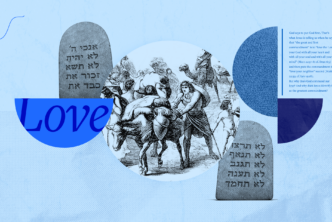“Remember the Sabbath, to keep it holy.” As a child, it often seemed like this command was about attending church services and not doing certain things we did on other days of the week. But what does it mean to remember the Sabbath? Is it something important for us to observe today? What does God tell us in his Word? Let’s start from the beginning.
What is Sabbath?
How did Sabbath begin in the Bible?
Remember the Sabbath day to keep it holy
Does the New Testament talk about Sabbath?
Should Christians keep the Sabbath?
How you can study the Sabbath with the free Logos app
What is Sabbath?
In its simplest definition, Sabbath is a time of rest. It is both a gift and a reminder from a loving God to his people. A prompt to acknowledge our complete reliance on God. A space for pause and restoration. And a hope for the future when God renews all.
Sabbath invites us to stop our striving. God graciously invites his people not just once, but repeatedly. That a time of Sabbath should occur every seventh day is first introduced in the creation narrative in Genesis. After the six days of creation are cataloged, we read this: “And on the seventh day God finished his work that he had done, and he rested on the seventh day from all his work that he had done. So God blessed the seventh day and made it holy, because on it God rested from all his work that he had done in creation” (Gen 2:2–3).
In the beginning God created … and then he rested? We know God does not need rest in the same way we need rest, so what does this mean? David Alves, in his Sabbatical Primer for Pastors, suggests that “rest”—which we find in many English translations—might not contain the fullness of what is happening here. He writes:
The Hebrew word shabbat, used by God in Genesis, is really a stopping or ceasing more than a rest. God never tires. He did not rest on the seventh day. He is the one who never sleeps nor slumbers. He needs no rest. Bible translators would have better served us to stay closer to the denotative definition of the Hebrew than to have made it seem that God just took a short breather. He ceased from his work. He stopped what he was doing. That is what he meant to communicate. Therefore, that is what he calls us to do on our Sabbath—make an abrupt end to our labor. All labor? No, our usual labor—the labor we’ve been doing the other six days of the seven-day week.1
In Genesis, we see God modeling for us the pattern he has built into this world—a rhythm of work and rest. We find elsewhere that this rhythm applies not only to us but to the land and animals—a sign that God cares for all of his creation (see Exod 23:10–11, Lev 25:4).
How did Sabbath begin in the Bible?
The first direct mention of Sabbath in the Bible is in Exodus. After rescuing Israel from Egypt, God further provides for them in the wilderness with daily provision of food—bread in the morning and quail in the evening. In this act is also an invitation to trust him. Each day the people are to gather only enough for the day, trusting God will provide their sustenance again on the next day. The exception to this rule is on the sixth day. On the sixth day, they were to gather enough food for two days’ time. On the seventh day, they were to observe the Sabbath Day. As Moses said,
This is what the Lord has commanded: ‘Tomorrow is a day of solemn rest, a holy Sabbath to the Lord; bake what you will bake and boil what you will boil, and all that is left over lay aside to be kept till the morning’ … ‘Eat it today, for today is a Sabbath to the Lord; today you will not find it in the field. Six days you shall gather it, but on the seventh day, which is a Sabbath, there will be none…. So the people rested on the seventh day (Exod 16:23, 25–26, 30).
In this provision and in this Sabbath, God was giving his people deep rest from their long labors. They had been where there was no rest, where they were driven daily, where they were enslaved. But now, the Lord tells them, “I bore you on eagles’ wings and brought you to myself” (Exod 19:4).
And, what are a people to do who are brought unto the Lord, saved and rescued by him? He tells them:
Remember the Sabbath day, to keep it holy. Six days you shall labor, and do all your work, but the seventh day is a Sabbath to the LORD your God. On it you shall not do any work, you, or your son, or your daughter, your male servant, or your female servant, or your livestock, or the sojourner who is within your gates. For in six days the LORD made heaven and earth, the sea, and all that is in them, and rested on the seventh day. Therefore the LORD blessed the Sabbath day and made it holy (Exod 20:8–11).
And, in this telling, God uses himself as example and model, linking Sabbath observance back to creation. He also calls it a sign of the covenant:
Therefore the people of Israel shall keep the Sabbath, observing the Sabbath throughout their generations, as a covenant forever. It is a sign forever between me and the people of Israel that in six days the LORD made heaven and earth, and on the seventh day he rested and was refreshed (Exod 31:16–17).
When Moses addresses the Israelites after forty years of wandering in the wilderness, he reiterates the Ten Commandments and exhorts them to remember all they have gone through and all God has promised. Moses recounts God’s faithfulness to them, even when they turned away from God.
In this iteration of the commandments, we find a slight variation in emphasis—from “remember” to “observe.” Addressing a new generation who had never been enslaved, he reminds them of why observation of the Sabbath is important and how it is linked to the freedom the Lord provided them in his rescue:
Observe the Sabbath day, to keep it holy, as the LORD your God commanded you. Six days you shall labor and do all your work, but the seventh day is a Sabbath to the LORD your God. On it you shall not do any work, you or your son or your daughter or your male servant or your female servant, or your ox or your donkey or any of your livestock, or the sojourner who is within your gates, that your male servant and your female servant may rest as well as you. You shall remember that you were a slave in the land of Egypt, and the LORD your God brought you out from there with a mighty hand and an outstretched arm. Therefore the LORD your God commanded you to keep the Sabbath day (Deut 5:12–15).
Remember the Sabbath day to keep it holy
Remembering and observing this day was not only a required ritual or a day off from working. It was also an acknowledgment of God’s power and provision as Creator and Sustainer of all. It was a gift of rest, refreshment, and freedom.
When Israel did not observe Sabbath, it was a sign that all was not right. It was a sign of a people not following or relying on God, and there were terrible consequences. We see this laid out in the words of the prophets, such as in Isaiah and Amos.
Thus says the LORD: “Keep justice, and do righteousness, for soon my salvation will come, and my righteousness be revealed. Blessed is the man who does this, and the son of man who holds it fast, who keeps the Sabbath, not profaning it, and keeps his hand from doing any evil” (Isa. 56:1–2).
Isaiah goes on to extend this blessing beyond the Israelites to the foreigner and the eunuch and anyone who has joined themselves to the LORD:
… everyone who keeps the Sabbath and does not profane it, and holds fast my covenant—these I will bring to my holy mountain, and make them joyful in my house of prayer; their burnt offerings and their sacrifices will be accepted on my altar; for my house shall be called a house of prayer for all peoples (Isa 56:6–7).
Not only is God concerned with his people acknowledging and trusting him, he is also deeply concerned for how his people treat others. God has strong words for those who oppress others, and we see how Sabbath keeping or breaking is often tied to this oppression. During the time of Amos, Israel is characterized as a people who trample the poor and who are not concerned with remembering God or what he has done for them. Rather, they prioritize commerce, earning money, and dealing dishonestly:
Hear this, you who trample on the needy and bring the poor of the land to an end, saying, ‘When will the new moon be over, that we may sell grain? And the Sabbath that we may offer wheat for sale, that we may make the ephah small and the shekel great and deal deceitfully with false balances, that we may buy the poor for silver and the needy for a pair of sandals and sell the chaff of the wheat? (Amos 8:4–6).
Not keeping Sabbath is seen as desecration and blindness, a despising of God’s good gift, and an affront, something that the people are doing to God (see Ezek 20, 22).
Honoring the Sabbath is a sign of repentance, of returning to God.
If you turn back your foot from the Sabbath, from doing your pleasure on my holy day, and call the Sabbath a delight and the holy day of the LORD honorable; if you honor it, not going your own ways, or seeking your own pleasure, or talking idly, then you shall take delight in the LORD … (Isa 58:13–14).
So, with such dire warnings for the people of God if they do not observe the Sabbath, what does this mean for us today? Let’s look at what the New Testament has to say about Sabbath.
Does the New Testament talk about Sabbath?
One of the reasons we might have questions surrounding the observance of Sabbath today is that there is a transition between the Old Testament and New Testament practices. That shift, of course, came in the form of Christ himself.
While Jesus observed the Jewish Sabbath and regularly attended synagogue (Luke 4:16), he had no patience with the burdensome requirements that had been added on to God’s law by the religious leaders of his time. When the Pharisees rebuke him for healing on the Sabbath, his response is that “it is lawful to do good on the Sabbath” (Matt 12:12).
Or, when they rebuke his disciples for plucking grain from a field, he reminds them, “The Sabbath was made for man, not man for the Sabbath.” He follows this by making the startling claim, one of many to his contemporary audience, “So the Son of Man is lord even of the Sabbath” (Mark 2:27–28).
At the same time, he said, “Do not think that I have come to abolish the Law or the Prophets; I have not come to abolish them but to fulfill them” (Matt 5:17).
After Christ’s resurrection and ascension, we see a further transition.
In Acts we read about the apostles going to synagogue on the Sabbath day (Acts 13) but also that they gather on the first day of the week to break bread (Acts 20). Gathering on the first day of the week commemorates the resurrection of Jesus and his appearance to his disciples, where he offers them his peace, commissions them to be sent as He was sent by his Father, and gives them the gift of the Holy Spirit (John 20).
In recognition of this, it has become customary for Christians to gather on the first day of the week instead of the seventh day. However, the New Testament Scriptures do not make this a new rule of law. Today some Christians observe the seventh day as a time of gathering and communion, while others observe the first day as the new Sabbath day.
The author of Hebrews writes, “There remains a Sabbath rest for the people of God, for whoever has entered God’s rest has also rested from his works as God did from his” (Heb 4:9). In this reminder hearkening back to the Old Testament, we are encouraged not to forsake entering into the rest that God models and offers to his people—a rest that points to our future and complete rest in him, a rest that is our salvation.
Should Christians keep the Sabbath?
Our true Sabbath rest is found in Christ. But as he reminds us, the Sabbath was made for us. As we see in the Bible, it is a gift from God and a built-in rhythm to creation. Christ did not do away with the Sabbath, but he freed it from the bindings of the religious leaders of his time, from those who made it burden and not delight. Sabbath as demonstrated by Jesus involved attending religious services, but it also included doing good, healing the sick, eating with friends, and helping others.
In Christ, we are given a tremendous freedom in our use of the gift of the Sabbath. As Paul writes, “let no one pass judgment on you in questions of food and drink, or with regard to a festival or a new moon or a Sabbath” (Col 2:16) and “One person esteems one day as better than another, while another esteems all days alike. Each one should be fully convinced in his own mind” (Rom 14:5). He continues:
The one who observes the day, observes it in honor of the Lord. The one who eats, eats in honor of the Lord, since he gives thanks to God, while the one who abstains, abstains in honor of the Lord and gives thanks to God. For none of us lives to himself, and none of us dies to himself. For if we live, we live to the Lord, and if we die, we die to the Lord. So then, whether we live or whether we die we are the Lord’s (Rom 14:6–8).
So, while a day of Sabbath may look different for each us, it’s worthwhile to consider what it might mean for us to regularly set apart one day in seven to a time of ceasing from labors and resting in God, his promises, and his provisions.
Why Sabbath?
As God offered a new way to Israel when he rescued them, so he offers us, too, a freedom in Christ. In that freedom, perhaps we need to pause and ask ourselves who are we truly resting in and relying upon?
Are we finding our identity in Christ, or in something else? Are we overly relying on ourselves or other people for outcomes or provisions? Do we think everything will fall apart if we are not constantly worried about it? Are we endlessly caught up in cycles of activity and consumption? Are we living as if we cannot make it through our week if we do not work nonstop? Or if we do not have this thing or that?
Often we do not consciously think these things. If asked, we would say we trust God! Practically, however, many of us operate as if we can trust no one but ourselves, that we cannot make it through without that next cup of coffee, or that we are failing if our lives do not look a certain way.
When we intentionally pause for a day of Sabbath, we are acknowledging that all is, indeed, in God’s hands. We are trusting the Creator of all with the outcomes of the day and of our lives. We are learning to be instead of how to do. We are learning to rest instead of strive.
In Sabbath as Resistance: Saying No to a Culture of Now, Walter Brueggemann talks about Sabbath as both resistance and alternative—“a visible insistence that our lives are not defined by the production and consumption of commodity goods” and “an alternative to the demanding, chattering, pervasive presence of advertising and its great liturgical claim of professional sports that devour all our ‘rest time’”2. He reminds us:
“Sabbath is not simply the pause that refreshes. It is the pause that transforms”.3
So, what are some of the practices that can help us with this pause?
Suggestions for how to keep the Sabbath
If we are not in the habit of practicing a full day of Sabbath, it may be something that we practice in smaller increments at first. Some find it helpful to observe the Sabbath from sundown to sundown, e.g., starting one’s observation on Saturday evening and concluding on Sunday evening, while others observe the day starting in the morning. For those who find their workweek includes Sunday (such as those in ministry or other helping professions) it may be that we find another day of the week for observation. It is generally agreed that whichever day we set aside for rest and worship, that it be the same day each week, if at all possible, so that we inhabit the rhythm of one-in-seven that God established in creation.
In Embracing Rhythms of Work and Rest: From Sabbath to Sabbatical and Back Again, Ruth Haley Barton writes:
By establishing a sabbath practice, we affirm and accept that God is the only one who is infinite, and we are finite. This means we live within the physical limits of time and space, strength and energy. There are limits to our relational, emotional, mental, and spiritual capacities. By being faithful to a sabbath practice, we are saying in a concrete way, “God is the only one who can be all things to all people; I am not. God is the only one who can be in two places at once; I am not. God is the one who never sleeps; I am not.4
In Embracing Rhythms, Barton concludes each chapter with reflection questions that can help us examine our attitudes and relationship towards a day of Sabbath, as well as the things that might be getting in our way of practicing.
Wayne Muller, in Sabbath: Finding Rest, Renewal, and Delight in Our Busy Lives, also includes practical suggestions with each chapter in his book. These can include things such as enjoying a meal, taking a walk to marvel in God’s creation, spending time in prayer, or reflecting on a particular passage in the Bible—with the goal being not accumulating knowledge or expanding our studies but really enjoying and resting in God’s word.
Sometimes we might benefit from a physical action that reminds us that we are setting aside this day. A practice from Jewish tradition is the use of a “Sabbath box.” Muller writes:
Make a Sabbath box. When you set aside time for Sabbath—whether it is an hour, a morning, or a day—put in the box those things you do not want to use…. You can also use the Sabbath box to hold all the things you feel you have left undone. Perhaps write on a small piece of paper a word or phrase that signifies a particular worry or concern you would like to leave behind for the time being….5
John Mark Comer, in The Ruthless Elimination of Hurry, talks about his family’s practice of locking away phones and other electronic devices:
Just before sunset on Friday, we finish up all our to-do lists and homework and grocery shopping and responsibilities, power down all our devices (we literally put them all in a box and stow it in a closet), and gather around the table as a family. We open a bottle of wine, light some candles, read a psalm, pray. Then we feast, and we basically don’t stop feasting for the next twenty-four hours.6
As we’ve been seeing, there is freedom in our practices and space for us to develop a rhythm that encourages our worship of and rest in God. As Marva Dawn encapsulates it, Sabbath is a time for ceasing, resting, embracing, and feasting. She writes, “the goal is to have a special day set apart for praising God and trusting his grace.”7
***
How you can study the Sabbath with the free Logos app
You can study Sabbath with the Logos Bible app on web, mobile, or desktop.
Here are a few great places to start!
- The Factbook tool in Logos [Logos > Tools > Factbook] is a great way to explore Sabbath and what the Bible tells us. It pulls together key definitions, articles, Bible passages, and other resources in one convenient location.
- For a deeper dive into the the biblical languages, try the Bible Word Study tool [Logos > Guides > Bible Word Study].
- For a broader look at related topics, conducting a search for Sabbath in the Topic Guide [Logos > Guides > Topic Guide] brings you to explorations of feasts and festivals, the Lord’s Day, and more.
Related articles
On Shifting Your Sabbath Habits
Fighting Spiritual Fatigue with True Soul Rest
Related resources
From Sabbath to Lord’s Day: A Biblical, Historical and Theological Investigation
Regular price: $26.99
Subversive Sabbath: The Surprising Power of Rest in a Nonstop World
Regular price: $19.99

Sabbath: The Gift of Rest: 8 Studies for Individuals or Groups: With Notes for Leaders
Regular price: $5.99
The Sabbath as Rest and Hope for the People of God (Short Studies in Biblical Theology)
Regular price: $13.99
- Quoted in Ruth Haley Barton, Embracing Rhythms of Work and Rest: From Sabbath to Sabbatical and Back Again (InterVarsity Press, 2022): 21.
- Walter Brueggemann, Sabbath as Resistance: Saying No to a Culture of Now (Westminster John Knox Press, 2017): xiv
- Brueggemann, 45.
- Barton, 97.
- Wayne Muller, Sabbath: Finding Rest, Renewal, and Delight in Our Busy Lives (Bantam Books, 1999), 60.
- John Mark Comer, The Ruthless Elimination of Hurry (Waterbrook, 2019), 175.
- Marva J. Dawn, Keeping the Sabbath Wholly: Ceasing, Resting, Embracing, Feasting (Wm. B. Eerdmans Publishing Company, 1989), 213.








